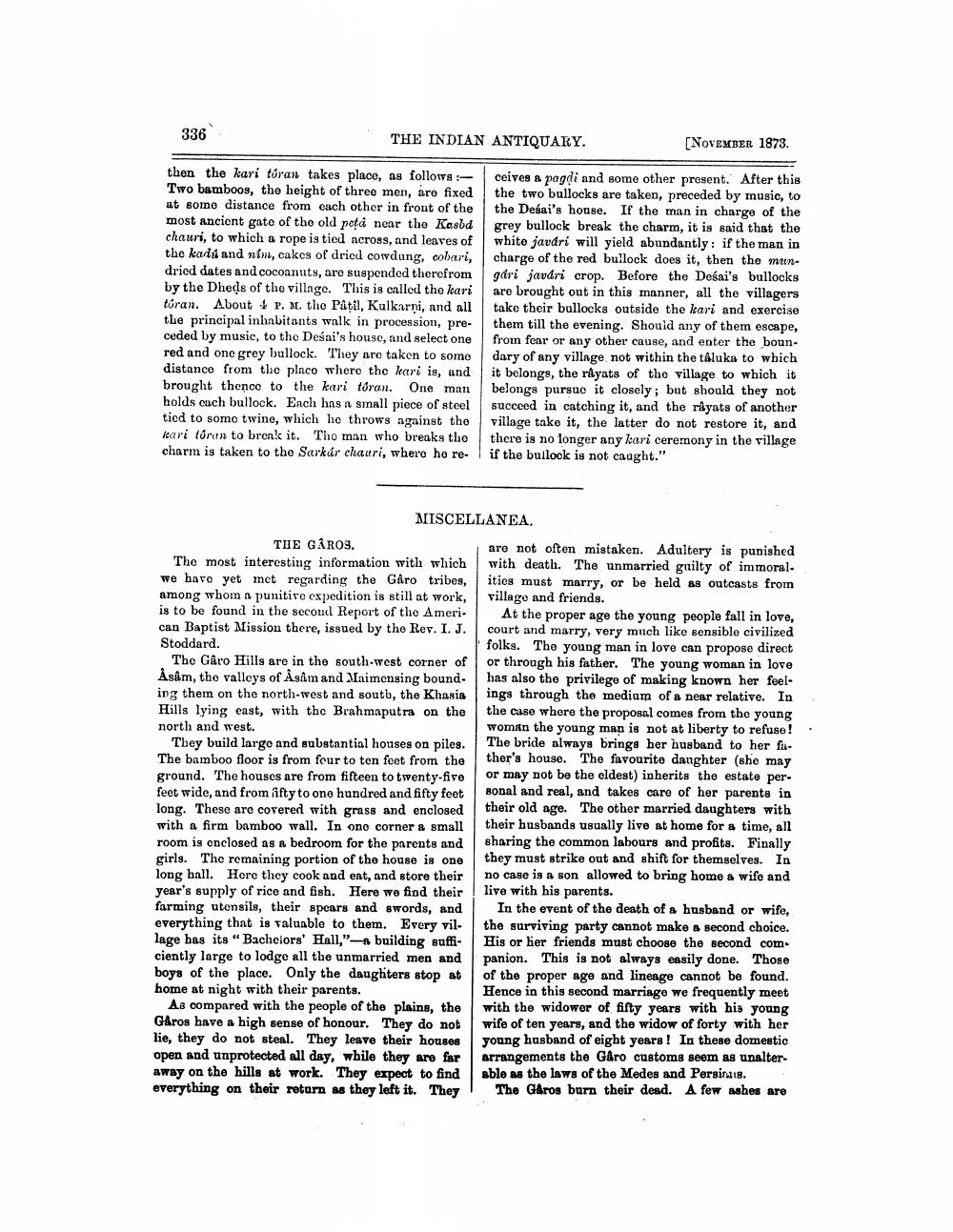________________
336
THE INDIAN ANTIQUARY.
then the kari tóran takes place, as follows: Two bamboos, the height of three men, are fixed at some distance from each other in front of the most ancient gate of the old petâ near the Kasbd chauri, to which a rope is tied across, and leaves of the kadú and ním, cakes of dried cowdung, cobari, dried dates and cocoanuts, are suspended therefrom by the Dheds of the village. This is called the kari túran. About P. M. the Pâtil, Kulkarni, and all the principal inhabitants walk in procession, preceded by music, to the Desai's house, and select one red and one grey bullock. They are taken to some distance from the placo where the kari is, and brought thence to the kari toran. One man holds cach bullock. Each has a small piece of steel tied to some twine, which he throws against the kari toran to break it. The man who breaks tho charm is taken to the Sarkár chauri, where he re
MISCELLANEA.
THE GAROS.
The most interesting information with which we have yet met regarding the Gâro tribes, among whom a punitive expedition is still at work, is to be found in the second Report of the American Baptist Mission there, issued by the Rev. I. J. Stoddard.
The Garo Hills are in the south-west corner of Åsâm, the valleys of Asâm and Maimensing bound ing them on the north-west and south, the Khasia Hills lying east, with the Brahmaputra on the north and west.
[NOVEMBER 1873.
ceives a pagdi and some other present. After this the two bullocks are taken, preceded by music, to the Desai's house. If the man in charge of the grey bullock break the charm, it is said that the white jaudri will yield abundantly: if the man in charge of the red bullock does it, then the mungári javári crop. Before the Desai's bullocks are brought out in this manner, all the villagers take their bullocks outside the kari and exercise them till the evening. Should any of them escape, from fear or any other cause, and enter the boundary of any village not within the taluka to which it belongs, the râyats of the village to which it belongs pursue it closely; but should they not succeed in catching it, and the râyats of another village take it, the latter do not restore it, and there is no longer any kari ceremony in the village if the bullock is not caught."
They build large and substantial houses on piles. The bamboo floor is from four to ten feet from the ground. The houses are from fifteen to twenty-five feet wide, and from fifty to one hundred and fifty feet long. These are covered with grass and enclosed with a firm bamboo wall. In one corner a small room is enclosed as a bedroom for the parents and girls. The remaining portion of the house is one long hall. Here they cook and eat, and store their year's supply of rice and fish. Here we find their farming utensils, their spears and swords, and everything that is valuable to them. Every village has its "Bachelors' Hall," a building sufficiently large to lodge all the unmarried men and boys of the place. Only the daughters stop at home at night with their parents.
As compared with the people of the plains, the Gâros have a high sense of honour. They do not lie, they do not steal. They leave their houses open and unprotected all day, while they are far away on the hills at work. They expect to find everything on their return as they left it. They
are not often mistaken. Adultery is punished with death. The unmarried guilty of immoralities must marry, or be held as outcasts from village and friends.
At the proper age the young people fall in love, court and marry, very much like sensible civilized folks. The young man in love can propose direct or through his father. The young woman in love has also the privilege of making known her feelings through the medium of a near relative. In the case where the proposal comes from the young woman the young man is not at liberty to refuse! The bride always brings her husband to her father's house. The favourite daughter (she may or may not be the eldest) inherits the estate personal and real, and takes care of her parents in their old age. The other married daughters with their husbands usually live at home for a time, all sharing the common labours and profits. Finally they must strike out and shift for themselves. In no case is a son allowed to bring home a wife and live with his parents.
In the event of the death of a husband or wife, the surviving party cannot make a second choice. His or her friends must choose the second com panion. This is not always easily done. Those of the proper age and lineage cannot be found. Hence in this second marriage we frequently meet with the widower of fifty years with his young wife of ten years, and the widow of forty with her young husband of eight years! In these domestic arrangements the Gâro customs seem as unalterable as the laws of the Medes and Persins.
The Garos burn their dead. A few ashes are




